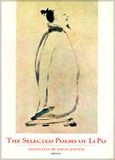February 5, 2010THE SELECTED POEMS OF LI PO
Review by Michael Meyerhofer
Anvil Press Poetry
Neptune House
70 Royal Hill
London SE10 8RF
UK
IBSN 978-0856462917
1998, 160 pp., $16.00
http://www.anvilpresspoetry.com
The elegant genius of Li Po hardly requires further mention here. As a long-time fan of Chinese and Japanese poetry in translation, I came to this book with great excitement and admittedly high expectations. That might have been my undoing. Despite the overwhelmingly beautiful imagery inherent in these deceptively simple poems, I found myself greatly distracted by the often strangled feel of David Hinton’s translations.
This is far from Hinton’s best work, I’m afraid. To be honest, I caught myself wondering more than once if these translations were done by one of my ESL students then just sent to press without much editing. I was surprised to learn that this book won the Landon Translation Prize from the Academy of American Poets, given that a large percentage of these translations are frankly very hard on the ears! I applaud Hinton’s efforts to bring still-greater attention to the fantastic poems of Li Po; unfortunately, the translator seems to have confused economy of language with playing fast with loose with basic grammar.
Case in point, a couple lines from Hinton’s translation of “Frontier Mountain Moon”: “A hundred thousand miles long, steady/wind scouring Jasper-Gate Pass howls.” Hinton’s translation forces a rather unnatural caesura after “Pass” and the whole line feels a bit overloaded, i.e. the wind is steady, scouring, AND howling without a single comma to let us catch our breath!
Now consider this alternative: “A hundred thousand miles long, steady/wind howls, scouring Jasper-Gate Pass.” Those simple changes are much easier on the ears and sacrifice none of the poem’s imagery.
Here’s another example, this time from “At Fang-ch’eng Monastery, Discussing Ch’an with Yuan Tan-ch’iu”: “It’s like boundless dream here in this/world, nothing anywhere to trouble us…. There’s a bird among blossoms calling…” The imagery is lovely but the syntax is unnecessarily rough. Again, consider a few simple changes: “This world is like a boundless dream,/nothing anywhere to trouble us…. There’s a bird calling among blossoms…” These slight alterations preserve the imagery and feel of the poem without completely losing the music of the lines.
Sometimes, the problem isn’t Hinton’s grammar so much as his word choice. Consider “Morning up near White River origins…” (“Written While Wandering the White River in Nan-Yang, After Climbing onto the Rocks”). To be fair, I don’t speak a lick of Chinese, but I can’t imagine Li Po intended the Chinese equivalent of as vague and bland a word as “origins.”
Another example is the odd choice of the word “distances” in “On heaven’s wind, a sea traveler/wanders by boat through distances” (“Song of the Merchant”). How on earth do you wander THROUGH distances? Why not just say, “On heaven’s wind, a sea traveler/wanders distances by boat”, or even the more liberal, “On heaven’s wind, a sea traveler/wanders great distances by boat”?
The point of a translation is to express the overall image and feel of the original work, given the rules and pitfalls of a different language. In other words, obviously some latitude must be taken on the part of the translator. Often, I get the feeling that Hinton was trying to pack each line with as many verbs and adverbs as possible.
Now and then, though, he gets it right. For example, in “At Yuan Tan-ch’iu’s Mountain Home,” he goes with “…still sound asleep under a midday sun…” instead of “still under a midday sun sound asleep…” which you might have expected, given his atrocious syntax elsewhere. I also really enjoyed his translation of Li Po’s four line poem, “Gazing at Crab-Apple Mountain”:
Up early, I watched the sun rise again.
At dusk, I watched birds return to roost.A wanderer’s heart sours bitterly. And here
on Crab-Apple Mountain, it’s only worse.
In general, Hinton is at his best when Li Po is at his briefest. Another good example is “Written on a Wall at Summit-Top Temple,” also just four lines:
Staying the night at Summit-Top Temple,
you can reach out and touch the stars.I venture no more than a low whisper,
afraid I’ll wake the people of heaven.
The use of the word “venture” is a bit strange, but far from a deal-breaker, given how Hinton manages to convey quite brilliantly the simple elegance of the poem as a whole. Still, there are times when the hiccups are just too hard to ignore.
Case in point: the final lines of “After Climbing Pa-ling Mountain, in the West Hall at K’al’yuan Monastery: Offered to a Monk Beyond this World on Heng Mountain”: “…I feed on kind winds,/ new blossoms teaching mind this vast.” I want to be clear on this: there’s a period after “vast.” Now, I don’t want to sound picky because I know that “vast” can technically be used as a noun, but aside from John Milton, you’d be very hard-pressed to find anyone who uses it as anything but an adjective. In other words, it’s unnecessarily and unproductively unusual, since I doubt Li Po had Milton in mind when he wrote it. A better word would be “vastness,” maybe “emptiness” or even “void” in the Zen sense. Also, “mind” requires “my” before it, since the poem is clearly referring to the narrator’s mind, not minds in general. I’m all for stylistic play with language, but this isn’t the place for it. This is Li Po, not e.e. cummings.
Overall, as much as I was irked by some of these translations, I still found merit in the book as a whole. As always, I applaud David Hinton for his work and influence. I just get the sense that these translations would be vastly improved with a little more time, a bit more polish, and maybe a bit more liberty on the part of the translator.